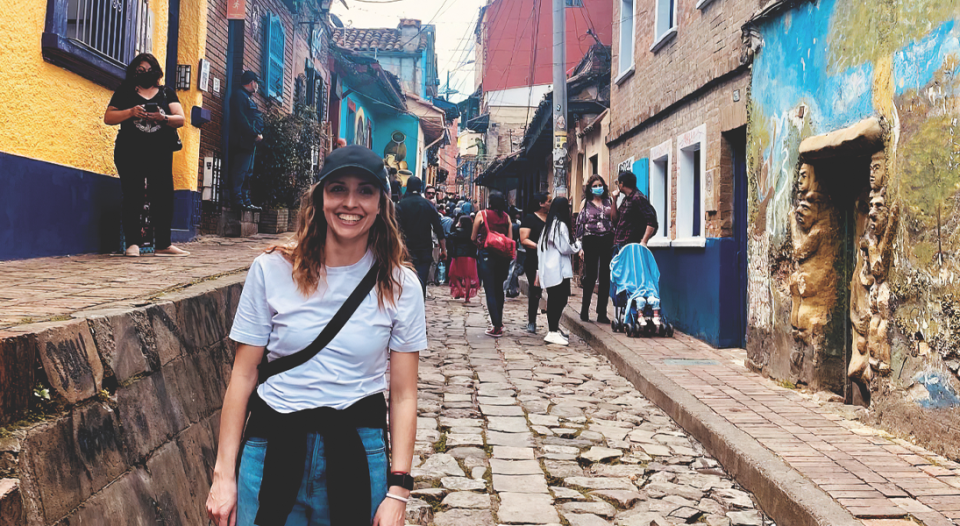“A church of the poor, serving the poor.”
That’s how Germán Loayza, president of the Bolivian Evangelical Lutheran Church (Iglesia Evangélica Luterana Boliviana, IELB), describes his church.
During the pandemic, the largest Indigenous Lutheran church in Latin America was there for its 8,500 members, who are largely Aymara and Quechua.
With its sights on the future, the IELB also persisted in calling a new missionary from the ELCA—a process the COVID-19 pandemic made even longer and more challenging.
Aaron Decker arrived in Bolivia in February. Just a few weeks later, Kaitlynne Larson arrived in Bogota, Colombia, to serve the Evangelical Lutheran Church of Colombia (Iglesia Evangélica Luterana de Colombia, IELCO).
“Despite challenges and difficulties, losses and pains of the pandemic, these companion churches and missionaries are resilient,” said Gustavo Driau, the Argentina-based ELCA regional representative for South America. “Together, they are beginning new ministries full of challenges and uncertainty, trusting in God.”
Decker sees in the IELB a deeply faithful church whose aging, mostly volunteer pastoral leadership is “deeply worried that their beloved church will not continue.”
“I never had so many people at a Bible study in my life. Questions have generated a faith seeking understanding with a hunger I’ve not seen before.”
His three-year call is to support the church in developing theological education for lay and ordained leaders alike. “While people here love their church, they don’t really understand what ‘Lutheran’ means,” Decker said.
At a district-level event, IELB pastoral leaders asked how to respond to questions about infant versus adult baptism fueled by “predatory churches in the next town over.” When Decker offered a last-minute, one-hour session on the topic, “I never had so many people at a Bible study in my life. Questions have generated a faith seeking understanding with a hunger I’ve not seen before.”
Previous ELCA mission personnel who supported theological education focused on face-to-face classes. Decker’s assignment is to develop a curriculum for some form of “seminary without walls” that will offer a way to educate and credential new leaders.
“Unfortunately, we do not have theologians with postgraduate studies,” said David Mamani, IELB education director. “Pastor Aaron’s contribution is extremely important. In the IELB, there is a tendency for the practice of rebaptism. To face these tendencies, we need written material, and he is preparing it.”
Distance learning would reach more IELB members, Decker said, but in a mountainous country with low levels of literacy, unreliable electricity, spotty internet, poor highways and no postal service, “the task ahead seems next to impossible—and that much more fun to try to figure out.
“Creativity, adaptivity and perseverance will be necessary to build the future God hopes for. And with God’s help, it will be exciting getting there.”
A country in transition
In Bogota, Larson finds herself in a church and country in transition—emerging from the pandemic and grappling with a new presidential administration. “People are asking big questions,” she said.
Larson, who is in the process of ordination with the ELCA through the Nebraska Synod, is engaging those big questions by building relationships with IELCO colleagues, congregations and members. Due to the long-term effects of the pandemic, she said, “it can be challenging building those relationships and learning from everyone as so much of our lives are now permanently virtual.”
Larson’s work supports the IELCO Justicia y Vida (Justice and Life) project, which promotes the protection and teaching of human rights and works toward reconciliation and peace in the wake of Colombia’s 50-year civil war.
Juan Pablo Álvarez Toro, Justicia y Vida program coordinator, called Larson’s background in community organizing among migrants “of great support to develop activities related to the empowerment of women and youth. Her experiences will enrich the project’s community work.”
“It can be challenging building those relationships and learning from everyone as so much of our lives are now permanently virtual.”
Justicia y Vida offers workshops on conflict resolution, knowing and exercising your rights, and protection of children’s rights. Its rural projects focus on economic development for women and raising their awareness of menstrual rights.
For Justicia y Vida leaders, human rights work means bringing dignity to people. “That’s theological,” Larson said. “Creating the kingdom of God now as we live it can be as simple as providing somebody with a way to have economic independence or the tools to have a menstrual period without feeling disgusting.”
Like Decker, she also leads conversations around theological topics, often encountering people who want to know more about what being Lutheran means. She draws on her theological education, but that has its limits. “I tell them, ‘You have the answers, because you live here, you have these faith communities,’” she said. “‘I’m here to learn from you as much as you’re going to learn from me.’”
One thing she will learn from the church in Colombia is how to be a pastor. Larson will complete her internship in an IELCO congregation during the last two years of her four-year call.
“We know this [time] in Colombia will be a great learning experience for her,” said Atahualpa Hernandez, bishop of the IELCO.
To learn more about ELCA missionaries, visit elca.org/missionaries.




